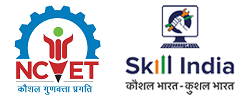Methodology
The assessment is done as per defined guidelines within the framework provided by respective RDATs/SSC/NSQF/MOT/ Industry/ State Directorate.
The assessment is based on the coordinated efforts of Head Office, State Offices, State Coordinators and field level assessors.,
Assessment is done only at designated & approved training/testing centers.
The assessment focuses on :
- Objectives
- Reliability
- Validity
- Practicality
- Fairness
- Comparability
Our approach towards assessment is:
- Assess the ability or competence of a person and not the person. Judgment is made under conditions when he/she can demonstrate at her / his best Use a positive attitude towards assessment. Find out what a person knows rather not know.
Follow scientific and well design skill assessment technique of competency based testing, taking Into account the QP/NOS assigned for each trade.
Having the advantage of logistic support and local resource person, use of regional language is More effective in conducting the assessment
The testing criteria cover theoretical knowledge and practical skills, including, viva test as well. More focus performing the practical task. The question paper would be for theory,
- Practical, viva, attitude test and safety requirements. Reliability Comparability Objectivity Validity Practicality Fairness.
Maximum number of candidates per trade does not exceed more than 30 per batch.
- The duration of competence tests will vary according to the Trade. Time taken by a competent person in real job environment. Standards for the job, if any, prescribed by professional bodies.
ASK (Attitude, Skills & Knowledge) approach is followed
- Attitude & Skills through Practical test using simulated work environment, skill demonstration with observation on safety, cleaning, handling of tools, problem solving approach etc. Knowledge through Written test using different types of objective.
Continuous updating of Test items (Question Bank) in line with the SSC trade QP/NOS.
Empanelment of qualified & experienced Assessors after accreditation with competent authorities to meet the growing need of quality skill assessment.
Induction training of each assessor on assessment methodology and periodic retraining to maintain the uniformity in assessment irrespective of location and Assessor.
User guide (guidelines for assessors) for every trade assessment.


